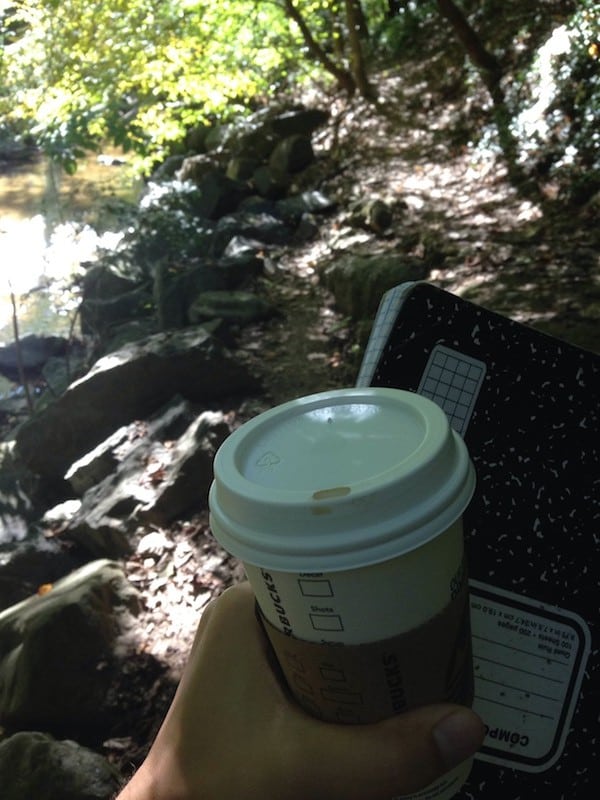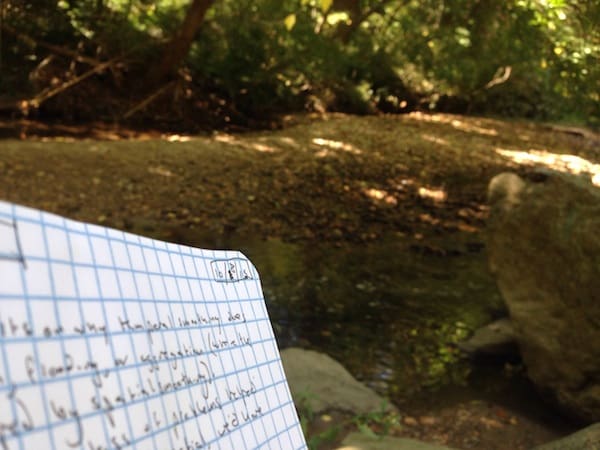
The Weirdo in the Woods
I took this picture last week. While most people enter the woods with a hiking stick, or perhaps a dog, I was the weirdo carrying a cup of coffee and a notebook.
But I was stuck on some early stage problems and needed some serious deep thinking to try to shake things loose — so I grabbed the tools of my trade and headed into the wilderness.
After about a half hour of walking and thinking, I stopped here to organize and record my thoughts:

By the time I finished my meander, I had broken through my log jam. Ever since, I’ve been scrambling to catch up with the thoughts this unleashed.
The Outside Office
There’s a surprising power to retreating to an outside office when there is serious thinking to be done.
Part of this power comes from the lack of interruptions. I brought my phone to take these photos, but usually I wouldn’t, which means any attempt to steal my time and attention at my outside office would require hiking boots.
But an equally important part comes from the setting. Nature has a way of filling your senses without demanding your attention (c.f., research on attention restoration theory), which, when combined with the act of walking, behaves like a performance enhancing drug for deep work.
These experiences reinforce my belief that for professions that require creativity, our notion of what constitutes an “office” is one that can and should be productively expanded.

I was struck by how often the people featured in Daily Rituals by Mason Currey went on a daily walk. There seems to be something to the act of walking that spurs the mind to deep action.
That’s a good point. I bet the sudden hype about mindfulness meditation brings to greater focus and deeper work.
A walk in the woods is some kind of meditation.
If you’d like to write outdoors, unencumbered by Internet distractions, with a incredible battery life, and with an LCD screen that works marvelously even in bright sunlight, check out the various Alphasmarts, particularly the Neo and Neo2. The latter two get some 700 hours of writing from cheap AA batteries.
https://en.wikipedia.org/wiki/AlphaSmart
They were built to teach typing and elementary writing skills to grade schoolers, but they work quite well for writing in the woods or on the go. Any USB A-B cable like those used with printers will connect one to your computer, where what you’ve written will be transferred into a document just like it was being typed.
You can pick up a Neo or Neo2 on ebay for under $30. They’re identical except the latter has a few extra features for school teachers that don’t apply to writing.
They’re great for writing while commuting too. They’re rugged, include a keyboard, and look so unusual you need not worry about a snatch-and-run thief.
Thanks for this information. I am planning on buying my first tablet soon and this will come in handy.
I am quite positive that this idea of Cal’s will be useful to me. At least until the snow flies in Michigan!
Cal,
I ran into an interesting site that expanded upon your career capital idea. I am interested in what you think:
https://80000hours.org/articles/career-capital/
PS: I am an undergrad math major (not sure whether I would like to work in academia or industry yet), and see math as arguably the best form of flexible career capital I can acquire. Consequently, my current plan is to simply apply deliberate practice to my math skills, so that I may have myriad opportunities in the job market. However, I’m afraid I might be overlooking a fatal flaw with this approach.
Your feedback would be greatly appreciated.
Another reason why outdoor office or study work is so effective–there’s no electric fields, EMF, or artificial light present to impinge on your body. If you try doing schoolwork outside, you may be pleasantly surprised.
Being a woman, I doubt if walking alone in such a place would be all that conducive to allowing my brain to sink into deep thought. More wary and watchful, than thoughtful, alas.
Libraries are usually my deep work places of choice.
I wholeheartedly agree with this post, Cal. I work outdoors once a week, and it’s refreshing and revitalizing for my creativity. It’s amazing the amount of original material that surfaces in just a couple hours, even without a computer to record it! Thanks Cal for documenting the benefits of this practice.
Tricia, I work outside at the public university in an area where there’s plenty of trees as well as people passing by. I definitely hear you about the gendered nature of “safety” — I would probably be outside so many more days if I didn’t share your concern. I’ve also come up with workable alternatives: walking in the park and stopping to jot down ideas when they come, or working on a park bench in a place with a lot of foot traffic. For me, the power of nature can come through a handful of trees. Even though I’d prefer complete wilderness, I also get creative with what’s possible and within my reach.
I am currently a graduate student at Swansea University, which is by the beach and inside a huge natural park. I’m definitely going to have a try, Carl.
Reminds me of this anecdote about Nietzsche’s daily routine:
“He then went for a brisk, two-hour walk through the nearby forest or along the edge of Lake Silvaplana (to the north-east) or of Lake Sils (to the south-west), stopping every now and then to jot down his latest thoughts in the notebook he always carried with him . . . After luncheon, usually dressed in a long and somewhat threadbare brown jacket, and armed as usual with notebook, pencil, and a large grey-green parasol to shade his eyes, he would stride off again on an even longer walk, which sometimes took him up the Fextal as far as its majestic glacier.”
Source: https://www.openculture.com/2013/10/the-daily-habits-of-highly-productive-philosophers.html
I love, love, love to work outside.
I agree that a walk is the best way to relieve stress and problem solve. Whenever possible, I bring my laptop outside to work. I find working outside makes the time almost as restorative a time as not working.
To your brilliance!
Elizabeth Grace Saunders
It’s really amazing what a simple walking session in nature can do to us when we are facing a really tough situation or when we are feeling down.
It acts like some sort of reboot therapy and works all the time!
I agree that it is great to get outside to do your work, whether it is to think of new ideas, or even just to read, getting outside refocuses you and helps you get back to the work you’ve been stressed out doing in the office.
Brilliant blog, Our door offices are so much more affective. Power of the outdoor office is the way forward.
Good work
Top SEO Strategies.
“Albert Einstein loved to take long walks and ride his bicycle around Princeton. He once said of E=mc2, ‘I thought of it while riding my bicycle.’ If you look at the daily routines of creative greats there is a strong link between some type of bi-pedal aerobic motion that engages all four brain hemispheres that leads to Eureka moments and creative breakthroughs.”
Source:
https://www.psychologytoday.com/blog/the-athletes-way/201310/einsteins-genius-linked-well-connected-brain-hemispheres
Yesterday I took a walk around my school campus just admiring the fall and the beautiul leaves. It made my day ten times better and I completely agree! It cleared my head and helped me get organize my thoughts.
I loved that I could relate to this! I have found for myself that the wilderness can be so therapeutic and relaxing. I have been able to accomplish so much thinking and have been able to figure out tough decisions while I’m up there. I would highly recommend this to anyone who feels stressed out.
This really touches home to me because where Im from we would always go into the woods if we needed to get some alone time or what not. In todays society we are so distracted by technology and our phones and if someone needs to be alone with their thoughts and figure something out the wilderness is the best place for that. This article was great and more people should try it out.
Sometimes you need to go out of the office to refresh and relax your mind. The office setting does not always make employees productive.
Cal, I can confirm that nature has a significant impact upon one’s mental state when doing creative work. I’ve been working remotely (without an office) for 11 years now, and about 4 years ago I transitioned to working outdoors almost exclusively.
Now, in Colorado, I work outdoors about 10/12 months per year… two of those months I usually bring a portable heater 😉 and the rest is below my 20° (tested!) limit.
I’ve written as well about working outdoors… On Medium at https://medium.com/@chrislorensson/outdoor-pixel-pushing-code-wrangling-20752af0d7a1 which spurred me to start my dedicated site at Nomadic Working.
Thanks for surrounding some solid scientific thinking for me! Love the blog.
Sin duda una recomendable manera de pensar utilizando los mecanismos de nuestra mente.
El gran matemático Henri Poincaire lo documentó en sus escritos
Gracias
Agree with everything here but the coffee choice. Cal, et al., you should check out Kimera Koffee, a nootropic infused blend that boosts cognition. I make mine Bulletproof style (Dave Asprey) and there is no finer compliment to Deep Work, in the woods or elsewhere.
Go Deep!
Well Cal you have inspired me, thank you! I will provide for myself an outdoor office – https://www.jakeshell.com/articles/2017/1/8/outdoor-office